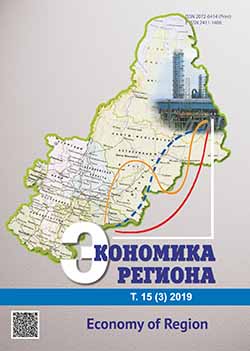НАЛОГОВЫЕ ЛЬГОТЫ В СИСТЕМЕ НЕДРОПОЛЬЗОВАНИЯ: ВОСПРОИЗВОДСТВЕННЫЙ АСПЕКТ
Tax Incentives in the System of the Natural Resources Management: Reproduction Aspect
Author(s): Irina Valeryevna Sharf, Alexander Alexandrovich MikhalchukSubject(s): Economy
Published by: Институт экономики Уральского отделения Российской академии наук
Keywords: paradigm; the hydrocarbons’ reproduction; oil production; reserves increment; tax incentives; the state’s tax expenditures; investments; geological exploration; subject of the Russian Federation; DEA
Summary/Abstract: The relevance of analysing the impact of various factors (including finance and tax mechanisms) on reproduction processes is due to the complex problem of reproducing the oil and gas resources. We focused on studying the tax incentives and the state’s tax expenditures on the mineral extraction tax, and particularly, on oil extraction tax. We hypothesised that differentiated impact of the tax incentives would necessitate the improvement of the incentive mechanisms in the context of transforming paradigm of the hydrocarbon resource base’s reproduction. The research methodology includes the analysis of the impact of the state’s tax expenditures on investments in geological exploration, prospecting operations, and growth of oil resources. We conducted this analysis based on statistical data on five regions of the Russian Federation using Data Envelopment Analysis. The obtained results of the comparative analysis have allowed dividing the analysed Russian regions into three clusters. In this case, Tomsk Oblast and KhMAO-Yugra form a cluster characterised by the minimal positive effect of tax incentives on oil resources’ reproduction. The research results have demonstrated the efficiency of the tax incentives in stimulating extraction that leads to the imbalances in the natural resources management. In the territorial aspect, the hydrocarbons resource base and oil-and-gas industry’s sectoral structure cause that imbalance. In the technological aspect, the imbalance is due to the extraction’s intensification that negatively affects the resources’ reproduction. Based on the analysis, we suggest introducing a justified investment of a part of the released capital (as a result of tax incentives) belonging to users of natural resources into geological exploration in accordance with regional principles. The study’s results can be used in the field of finance and tax legislation as well as in oil-and-gas industry management in the sphere of geologic exploration.
Journal: Экономика региона
- Issue Year: 15/2019
- Issue No: 3
- Page Range: 791-805
- Page Count: 14
- Language: Russian

